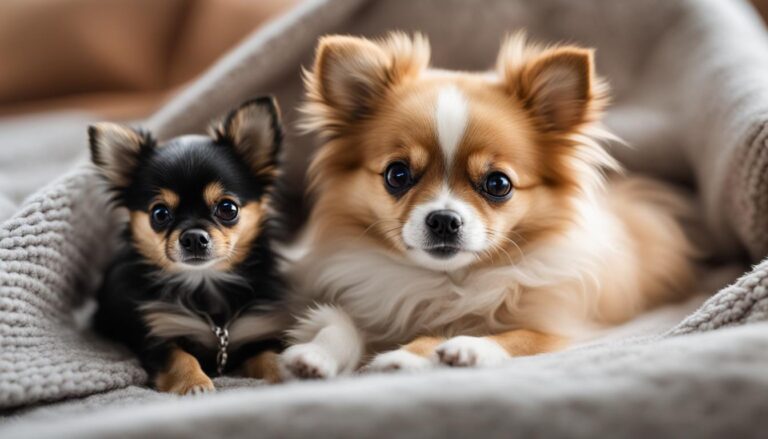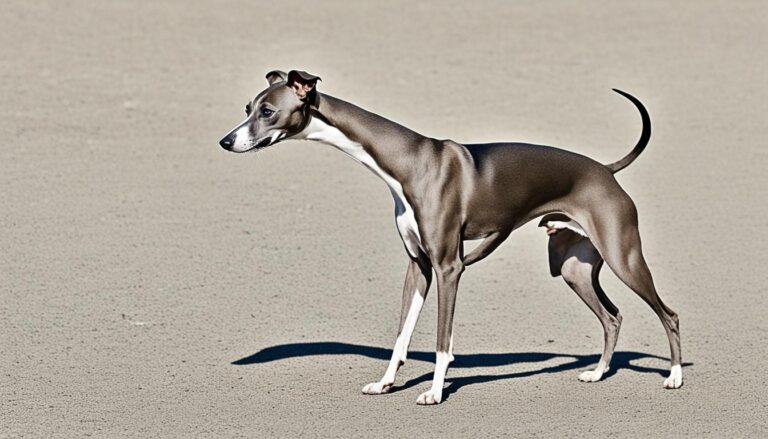Brussels Griffon Full Description & Traits
Did you know that the Brussels Griffon, a small and charming dog breed, has a fascinating history that dates back to Belgium? Initially bred as rat catchers in stables, these delightful dogs quickly gained popularity as companion pets due to their adorable looks and lovable personality.
With their distinctive appearance characterized by short, pushed-in faces, large expressive eyes, and a wirey, dense coat available in various colors, Brussels Griffons are a breed that captures attention wherever they go. But there’s more to these dogs than just their looks.
Brussels Griffons are highly affectionate and form strong bonds with their owners. They thrive on human companionship and are known for their friendly, playful, and intelligent temperament. However, they can also be stubborn at times, requiring consistent and patient training to bring out their best qualities.
Whether you’re curious about their size, grooming needs, or health issues, join us as we delve into the world of Brussels Griffons, exploring their breed characteristics, temperament, training, care requirements, and fascinating history.
Key Takeaways:
- Vibrant history: Brussels Griffons have a captivating past, starting as rat catchers and evolving into beloved companion pets.
- Distinctive appearance: These dogs have short, pushed-in faces, large expressive eyes, and a wirey, dense coat in various colors.
- Affectionate and playful: Brussels Griffons form strong bonds with their owners and thrive on human companionship.
- Intelligent but stubborn: They are quick learners but may require consistent and patient training due to their independent nature.
- Specific care requirements: Proper socialization, grooming, exercise, and regular veterinary care are essential for their well-being.
Brussels Griffon Breed Characteristics
Brussels Griffons are small dogs known for their unique characteristics. Here are some key traits that make this breed stand out:
Size
Brussels Griffons are typically small in size, measuring 10-12 inches tall at the shoulder. They are compact dogs, weighing between 7-12 pounds.
Appearance
These dogs have a distinctive appearance with a wiry and dense coat. Their coat can come in various colors, including red, black, black and tan, or belge. Brussels Griffons have a charming expression, with their alert and attentive eyes. Some Griffons may have their ears cropped to stand upright, adding to their unique appearance.
Grooming
Grooming requirements for Brussels Griffons vary depending on their coat type. Smooth-coated Griffons typically require weekly brushing to keep their coat neat and free from mats. On the other hand, those with wiry coats need regular trimming every few months to maintain the desired length and texture.
| Breed Characteristic | Description |
|---|---|
| Size | Small, measuring 10-12 inches tall and weighing 7-12 pounds |
| Appearance | Distinctive wiry and dense coat, available in various colors; alert and attentive expression |
| Grooming | Smooth-coated Griffons require weekly brushing, while wiry-coated Griffons need regular trimming |
Overall, Brussels Griffons are unique and visually appealing dogs with their small size, distinctive coat, and adorable expression. Their grooming needs can vary, but proper maintenance ensures they look their best.
Brussels Griffon Temperament
Brussels Griffons are known for their friendly, playful, and intelligent temperament. These charming dogs have a natural affinity for their owners and are always eager to be by their side. Their affectionate nature allows them to form strong bonds, making them ideal companions for those seeking a loyal and loving pet.
While Brussels Griffons are generally happy and outgoing, they can also display caution or shyness when faced with new people or unfamiliar situations. To ensure a confident and stable temperament, early socialization is crucial. Exposing them to various environments, people, and animals at a young age helps them develop the necessary skills and confidence to navigate the world with ease.
Described as “full of self-importance,” Brussels Griffons can have a mind of their own. They possess a distinct personality that is both endearing and unique. Their independent streak, combined with intelligence, can make training a challenge at times. However, with patient and consistent training methods, Brussels Griffons can be quick learners and eager to please.
These spirited dogs thrive in families where they can participate in all activities and enjoy being close to their owners. Whether it’s accompanying their humans on outdoor adventures or cuddling up on the couch for some quality bonding time, Brussels Griffons are happiest when they’re in the company of their loved ones.
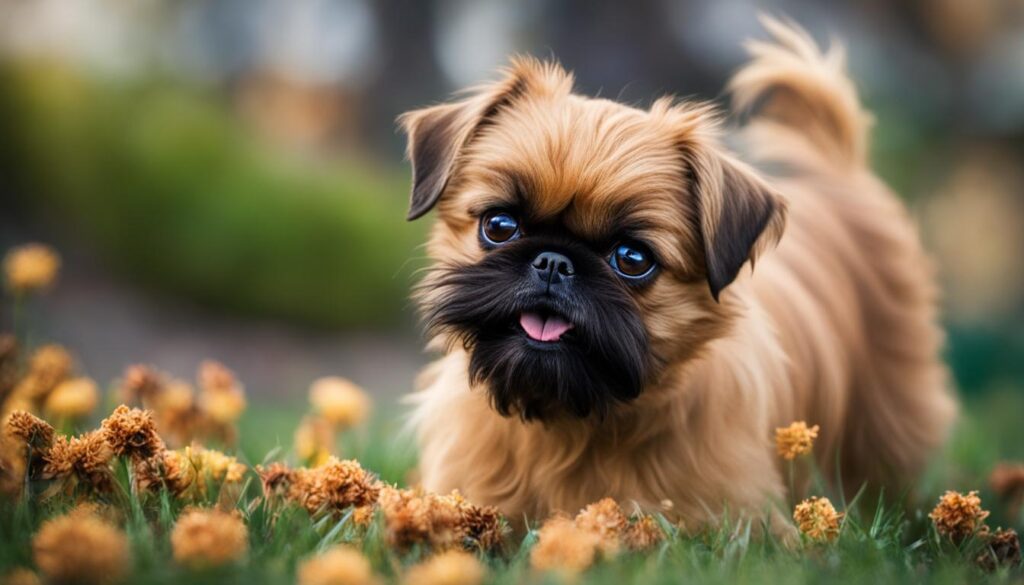
Brussels Griffon Personality Traits:
- Friendly and playful
- Affectionate and loyal
- Can be cautious or shy in new situations
- Independent with a mind of their own
- Intelligent and quick learners
Brussels Griffons are spirited and delightful companions, full of personality and charm.
Brussels Griffon Training
Training Brussels Griffons can be a rewarding experience, thanks to their intelligence and quick learning abilities. However, their strong-willed nature and occasional stubbornness may require a firm yet gentle approach.
Positive reinforcement methods, such as rewards and verbal praise, are highly effective for training Brussels Griffons. By offering treats or verbal affirmations when they exhibit desired behaviors, you can motivate and encourage them to continue their progress.
Establishing yourself as the leader is crucial during training. Setting clear boundaries and rules helps them understand your expectations and reinforces their training foundation. Brussels Griffons thrive in structured environments where consistency is maintained.
Consistency, kindness, and patience are key when training Brussels Griffons. They respond well to repetition and routines, so incorporating regular training sessions into their daily schedule is beneficial. Short yet focused sessions with breaks in between can help maintain their engagement and prevent them from becoming overwhelmed.
“Effective training for Brussels Griffons involves positive reinforcement techniques, consistent leadership, and patience. With time and dedication, they can become well-behaved and obedient companions.”
Socialization is Key
Early socialization is vital for Brussels Griffons to develop confident and well-rounded personalities. Introduce them to various people, animals, and environments from a young age. Exposing them to different situations and stimuli helps prevent fear or anxiety-related behaviors.
Brussels Griffons are highly adaptable, and they enjoy participating in various activities, such as obedience, agility, or trick training. Engaging their curious minds and providing mental stimulation through training exercises can prevent boredom and potential destructive behaviors.
Training Tips
Here are some tips to guide you in training your Brussels Griffon:
- Start training early: Begin training your Brussels Griffon as soon as you bring them home to establish good habits from the start.
- Keep training sessions short and focused: Brussels Griffons have a short attention span, so aim for frequent, brief sessions to maintain their focus.
- Be patient: Some Brussels Griffons can be stubborn, so approach training with understanding and patience.
- Use positive reinforcement: Reward desired behaviors with treats, praise, or playtime to motivate and reinforce their training progress.
- Be consistent: Maintain a consistent training routine, as inconsistency can confuse your Griffon and hinder their progress.
Remember, training is an ongoing process, and it requires time, effort, and consistency. With the right approach and techniques, you can have a well-behaved and obedient Brussels Griffon that brings joy and companionship to your life.
Brussels Griffon Care Requirements
Brussels Griffons have specific care requirements that owners should be aware of. They are indoor dogs and thrive on human companionship, so they should not be left alone for long periods.
These dogs do not do well with rough handling or teasing, so they are not recommended for households with very small children. Proper socialization is important to prevent any potential behavioral issues.
Brussels Griffons have low exercise needs and are content with moderate exercise such as short walks and indoor play. Grooming needs vary depending on coat type, with regular brushing or trimming required.
| Care Requirements | Description |
|---|---|
| Indoor Living | Brussels Griffons are indoor dogs and prefer to be with their owners. They do not thrive when left alone for long periods. |
| Avoid Rough Handling | These dogs are sensitive and do not tolerate rough handling or teasing. They are not recommended for households with very small children. |
| Socialization | Proper socialization from an early age is crucial to prevent behavioral issues. Exposing them to various people, animals, and environments helps develop a well-rounded and confident dog. |
| Exercise Needs | Brussels Griffons have low exercise requirements and are satisfied with moderate exercise such as short walks and indoor play. |
| Grooming | Grooming needs vary depending on the coat type. Smooth-coated Griffons require weekly brushing, while those with wiry coats need regular trimming every few months. |
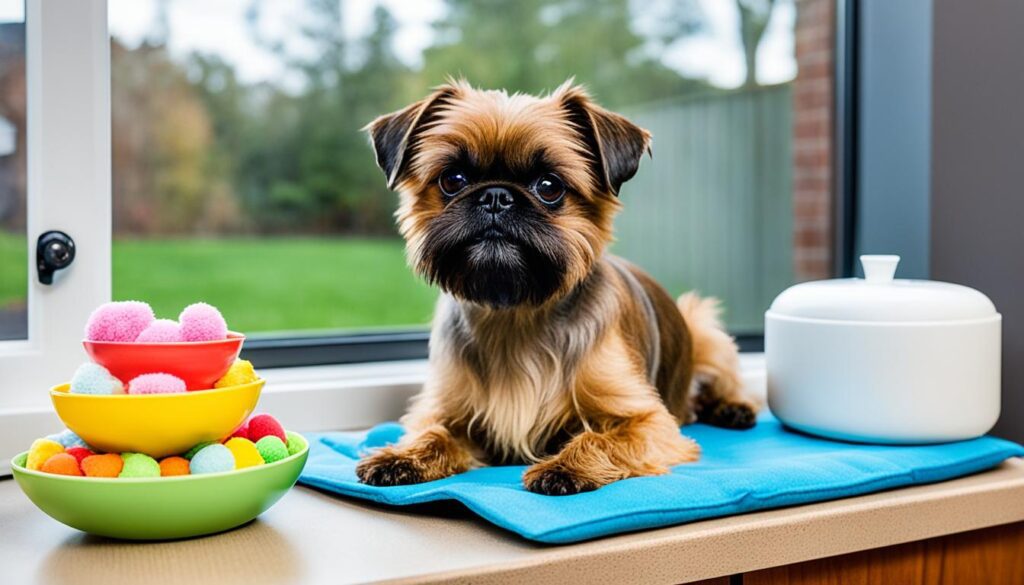
Brussels Griffon Health Issues
Like all dog breeds, Brussels Griffons are prone to certain health issues. It is important for potential owners to be aware of these conditions and take the necessary measures to ensure their Griffon’s well-being. Some of the common health problems seen in the breed include:
- Patellar Luxation (Kneecap Dislocation): This condition occurs when the kneecap moves out of its normal position, causing discomfort and mobility issues.
- Corneal Ulcers: Brussels Griffons are more susceptible to corneal ulcers due to their prominent eyes. These ulcers can be caused by irritants, infection, or trauma.
- Cherry Eye: Also known as prolapse of the third eyelid gland, cherry eye is a condition where the gland in the third eyelid becomes swollen and protrudes, leading to eye irritation and discomfort.
It is crucial to choose a responsible breeder who conducts health screenings on their breeding dogs to minimize the risk of these genetic health issues. Regular veterinary check-ups are essential for early detection and proper management of any potential health concerns. A well-balanced diet, regular exercise, and appropriate grooming practices also play a role in maintaining the overall health and well-being of Brussels Griffons.
Brussels Griffon Breed History
The Brussels Griffon breed has a fascinating history that dates back to Belgium. Originally, these dogs were bred as rat catchers in stables, providing a valuable service by helping to control rodent populations. However, it wasn’t long before their charming appearance and delightful personality caught the attention of people, and they started to gain recognition as companion dogs.
The popularity of Brussels Griffons soared when they captured the affection of Belgian Queen Henrietta Maria in the 1870s. Their small size, expressive faces, and endearing nature charmed the queen, and these dogs quickly became sought-after pets among the aristocracy and elite. Their reputation as loyal and devoted companions spread, leading to their popularity extending far beyond the borders of Belgium.
Brussels Griffons have become beloved family pets around the world, with individuals from all walks of life appreciating their unique qualities. These dogs have made appearances in movies, showcasing their distinctive looks and captivating presence. Notable figures such as fashion designer John Galliano and French actress Marie Lantelme have also been proud owners of Brussels Griffons, further cementing their place in popular culture.
In summary, the Brussels Griffon breed has a rich and storied history, beginning as skilled rat catchers and evolving into cherished companion dogs. Their unique appearance, delightful personality, and illustrious associations have contributed to their enduring popularity.
| Key Events | Significance |
|---|---|
| Bred as rat catchers in stables | Provided a valuable service by controlling rodent populations |
| Caught the attention of Belgian Queen Henrietta Maria | Increased their popularity and elevated their status as companion dogs |
| Gained recognition beyond Belgium | Became beloved family pets worldwide |
| Made appearances in movies | Highlighted their unique looks and captivating presence |
| Owned by notable individuals like John Galliano and Marie Lantelme | Further solidified their place in popular culture |
Living with a Brussels Griffon
Brussels Griffons are well-suited for apartment living due to their small size and low exercise needs. They are happy and adaptable dogs that enjoy being around their owners and participating in family activities. However, they are not recommended for households with very small children due to their small size and sensitivity. They are best suited for families where they can receive plenty of attention and be included in all aspects of family life. These dogs thrive on human companionship and may become depressed or mischievous if left alone for long periods. Responsible ownership includes providing proper socialization, training, exercise, and grooming.
Living with a Brussels Griffon in an apartment can be a wonderful experience. These small dogs are well-suited to indoor living as they do not require a large amount of space. Their low exercise needs make them ideal for apartment dwellers who may have limited access to outdoor areas. However, it is important to note that Brussels Griffons still require regular exercise to keep them mentally and physically stimulated.
Brussels Griffons are affectionate and love to be around their owners. They are not the type of dog that can be left alone for long periods of time. They thrive on human companionship and enjoy being included in all aspects of family life. They are social dogs that form strong bonds with their owners, and they may become anxious or develop behavioral issues if left alone for extended periods.
While Brussels Griffons are generally good with children, they are not recommended for households with very small children. The small size of these dogs makes them fragile, and they may not tolerate rough handling from young children. It is important to teach children how to interact with the dog appropriately and supervise their interactions to prevent any accidents or injuries.
To ensure a happy and healthy living arrangement with a Brussels Griffon, it is important to provide them with proper socialization, training, exercise, and grooming. Socializing them from a young age will help them develop confidence and positive behavior around people and other animals. Training should be consistent, using positive reinforcement techniques to motivate and reward desired behaviors. Brussels Griffons have low exercise needs but still require daily walks and mental stimulation to keep them happy and prevent boredom.
Grooming requirements for Brussels Griffons vary depending on their coat type. Smooth-coated Griffons require regular brushing to keep their coat healthy and shiny. Those with wiry coats may require professional grooming every few months to maintain their coat’s texture. Regular maintenance of their teeth, ears, and nails is also essential for their overall health and well-being.
Conclusion
Brussels Griffons are truly special companion dogs, renowned for their delightful personality and unique appearance. These small and charming creatures make wonderful additions to any household, bringing joy, love, and companionship. With their affectionate nature and adaptability, Brussels Griffons can thrive in various living situations, whether in an apartment or a house.
However, owning a Brussels Griffon comes with responsibilities. To ensure their well-being, proper care and attention are crucial. This includes providing them with the necessary socialization, training, exercise, and grooming. By being diligent and committed to their care, we can create an environment where these dogs can truly flourish.
Remember, Brussels Griffons are intelligent and adaptable dogs, ready to form strong bonds with their owners and become a loving member of the family. If you are seeking a loyal and affectionate companion, a Brussels Griffon may be the perfect choice. Make an informed decision, consider your lifestyle and commitment, and open your heart to the joy that these little dogs can bring.
FAQ
What are the breed characteristics of the Brussels Griffon?
The Brussels Griffon is a small and charming dog breed with a distinctive appearance and wirey, dense coat. They typically measure 10-12 inches tall at the shoulder and weigh between 7-12 pounds. Their coat can come in various colors such as red, black, black and tan, or belge. They have a friendly and playful temperament, and are known for their affectionate nature and strong bonds with their owners.
What is the temperament of the Brussels Griffon?
Brussels Griffons have a friendly, playful, and intelligent temperament. They are highly affectionate and form strong bonds with their owners. While they are generally happy, they can be cautious or shy with new people and new situations. Socialization from an early age is important for them to develop a confident and stable temperament. They are often described as “full of self-importance” and can have a mind of their own. They thrive in families where they can participate in all activities and enjoy being close to their owners.
How do you train a Brussels Griffon?
Brussels Griffons are intelligent and quick learners, making them relatively easy to train. However, they can also be stubborn at times and may require a firm hand and consistent training methods. Positive reinforcement techniques, such as rewards and praise, work well with these dogs. It is important to establish yourself as the leader and to set clear boundaries and rules. Training should be consistent, kind, and patient to bring out the best in these intelligent dogs.
What are the care requirements for a Brussels Griffon?
Brussels Griffons have specific care requirements that owners should be aware of. They are indoor dogs and thrive on human companionship, so they should not be left alone for long periods. These dogs do not do well with rough handling or teasing, so they are not recommended for households with very small children. Proper socialization is important to prevent any potential behavioral issues. Brussels Griffons have low exercise needs and are content with moderate exercise such as short walks and indoor play. Grooming needs vary depending on coat type, with regular brushing or trimming required.
What are the common health issues in Brussels Griffons?
Like all dog breeds, Brussels Griffons are prone to certain health issues. Some of the common health problems seen in the breed include patellar luxation (kneecap dislocation), corneal ulcers, and cherry eye. It is important to choose a responsible breeder who conducts health screenings on their breeding dogs to minimize the risk of these genetic health issues. Regular veterinary care, a balanced diet, and proper exercise are important for maintaining the overall health and well-being of Brussels Griffons.
What is the breed history of the Brussels Griffon?
The Brussels Griffon breed originated in Belgium and were initially bred as rat catchers in stables. However, their charming appearance and delightful personality quickly made them popular as companion dogs. The breed’s popularity grew when they caught the eye of Belgian Queen Henrietta Maria in the 1870s. Since then, Brussels Griffons have become beloved family pets around the world. In popular culture, they have made appearances in movies and have been owned by notable individuals such as fashion designer John Galliano and French actress Marie Lantelme.
Are Brussels Griffons suited for apartment living?
Yes, Brussels Griffons are well-suited for apartment living due to their small size and low exercise needs. They are happy and adaptable dogs that enjoy being around their owners and participating in family activities.
Are Brussels Griffons good family dogs?
Brussels Griffons can make wonderful family dogs. However, they are not recommended for households with very small children due to their small size and sensitivity. They are best suited for families where they can receive plenty of attention and be included in all aspects of family life. These dogs thrive on human companionship and may become depressed or mischievous if left alone for long periods.

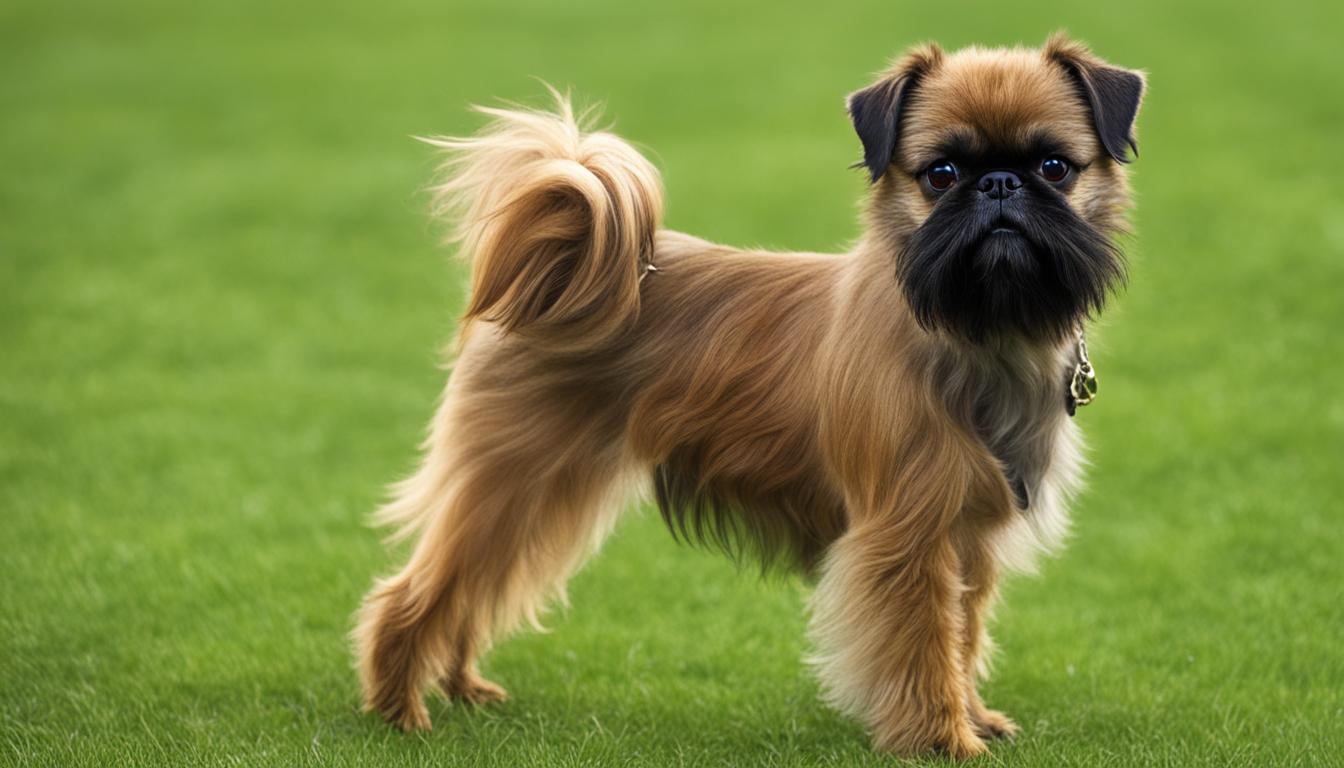


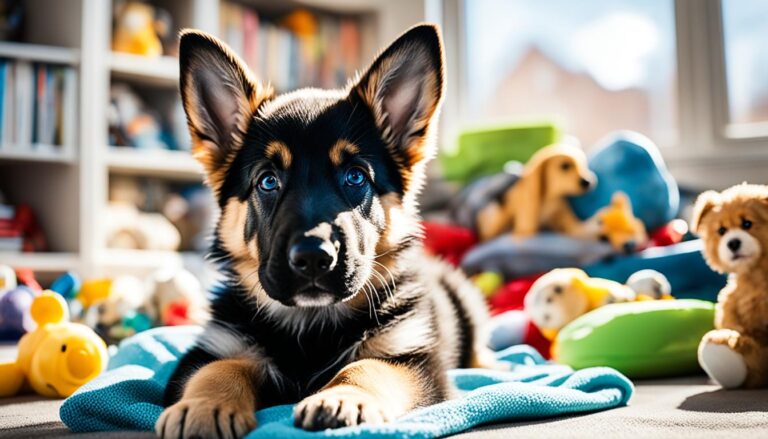
![Dogs That Barely Shed: Low-Maintenance Breeds ]](https://quitepuppy.com/wp-content/uploads/2024/07/337cdbb9-5d9e-49c0-9391-2effb48a09b6-768x768.webp)
